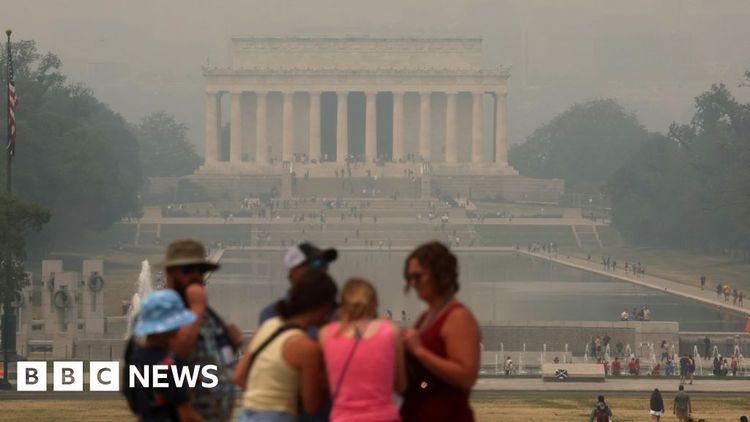Canada wildfires: US East Coast sees worst air quality in years

Watch: How to keep safe from wildfire smoke
By Bernd Debusmann Jr
BBC News, Washington DC
Washington DC and Philadelphia experienced their worst air quality in years as intense wildfires in Canada continue to impact millions.
The poor conditions have forced event cancellations and grounded flights across the US.
Nearly 100 million people are experiencing very poor air quality in North America.
US President Joe Biden described the fires as a "stark reminder of the impacts of climate change".
Data from the US Environmental Protection Agency's Air Quality Index (AQI) shows that cities in North America had the worst air quality in the world on Thursday morning.
Cities including Washington DC, Philadelphia and New York had significantly worse air quality than cities abroad such as Lahore, Dhaka and Hanoi.
The smoke has caused the cancellation of school outings and sporting events, and, in the capitol, the White House's planned pride celebrations.
The National Zoo was also closed, with its animals, including three giant pandas, taken indoors to shelter.
In Baltimore, residents across the city were wearing masks as they went about their day-to-day activities. One resident, Sean Montague, said that locals "have to put your health first and be cautious".
Much of the smoke is coming from Quebec, where 150 fires are burning. It is already Quebec's worst fire season on record.
"The smoke is impacting cities right across the Eastern Seaboard…I'm advised that nearly 100 million people are experiencing very, very poor air quality as a direct result of the smoke from these wildfires," Canada's Minister of Emergency Preparedness, Bill Blair, told the BBC's Newshour.
Some areas of Canada continued to experience very high levels of contamination on Thursday. The city of Janvier in Alberta, for example, had an AQI of 338, far above Washington DC's 293.
Mr Biden said he spoke to Canadian Prime Minister Justin Trudeau on Thursday and deployed more than 600 firefighters to help battle the blazes in Canada.
New York's Governor Kathy Hochul said one million masks would be given to residents on Thursday.
"This is a temporary situation. This is not Covid," she said at a news conference. The governor added that New York City buses and trains have high-quality air filtration systems that make them safe forms of travel.
Nicha Suaittiyanon, a 30-year-old tourist who was visiting New York City from Thailand, told AFP news agency the weather was making her eyes itchy and watery. "It smells like someone is doing a barbecue," she said.
On Washington's National Mall, Adriana George, 31, from Tucson, Arizona, said: "The fog is everywhere and it just seems kind of gloomy."
Environment Canada said conditions were worsening in Toronto on Thursday, as more smoke poured in. The agency has recommended that anyone outdoors wear a mask.
"These fine particles generally pose the greatest risk to health. However, respirators do not reduce exposure to the gases in wildfire smoke," the Environment Canada statement said.
Data from NOAA on Wednesday 7 June 2023
In New York, an orange haze blanketed the city's skyline and shrouded landmarks including the Statue of Liberty.
Public health officials have cautioned people not to exercise outside and to minimise their exposure to the smoke as much as possible, as the air poses immediate and long-term health risks.
Canadian officials say the country is shaping up for its worst wildfire season on record.
Experts have pointed to a warmer and drier spring than normal as the reason behind the trend. These conditions are projected to continue throughout the summer.
Fires across Canada have already burned an area that's 12 times the 10-year average for this time of year.
Climate change increases the risk of the hot, dry weather that is likely to fuel wildfires.
The world has already warmed by about 1.2C since the industrial era began, and temperatures will keep rising unless governments around the world make steep cuts to emissions.
Experts say exposure to wildfire smoke can cause a litany of health issues, such as an elevated pulse, chest pain, and inflammation in the eyes, nose and throat.
Additional reporting by Chelsea Bailey and Juan Benn in Baltimore
BBC Weather forecaster Chris Fawkes looks at when the wildfire smoke might clear
How have you been affected by the wildfires or air quality? What precautions are you taking? Share your experiences by emailing [email protected].
Please include a contact number if you are willing to speak to a BBC journalist. You can also get in touch in the following ways:
If you are reading this page and can't see the form you will need to visit the mobile version of the BBC website to submit your question or comment or you can email us at [email protected]. Please include your name, age and location with any submission.
Related Topics














































